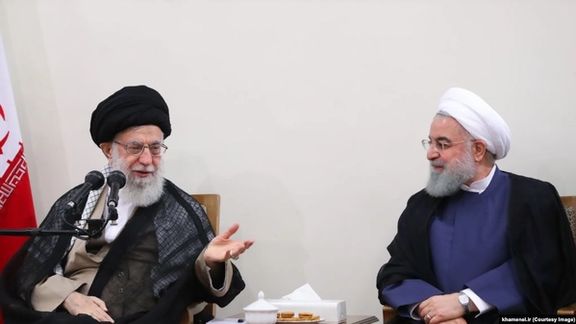News Of A Meeting Between Khamenei And Rouhani Sparks Speculations

Iran’s Supreme Leader Ali Khamenei has met ex-president Hassan Rouhani, apparently for the first time since Rouhani left office August after completing his second term.

Iran’s Supreme Leader Ali Khamenei has met ex-president Hassan Rouhani, apparently for the first time since Rouhani left office August after completing his second term.
The meeting was disclosed by Mohammad Mohajeri, an editorial-board member of Khabar Online website, in a Sunday tweet. "Even if no news gets out about the content of the recent one-hour meeting of Hassan Rouhani with the Supreme Leader, the news itself bears an important message for politicians, whether [they belong to the] right, or left, or are hardliners, etc.," Mohajeri noted.
Mohajeri's tweet was immediately picked up by several publications and social-media pundits ready to pronounce the encounter a success or disappointment for Rouhani.
Some media detected a possible signal that Khamenei would appoint Rouhani to a leading position, such as chairman of the Expediency Council, a post assigned to Akbar Hashemi Rafsanjani after he stood down as president in 1997 and currently held by Sadegh Larijani, the former chief justice.
Under fire
Others saw the meeting as the leader recognizing the work of Rouhani, who has been under fire from principlists in government and parliament in recent weeks, with some parliamentarians arguing he should be put in trial.
Mohajeri did not give a date for the meeting. Javad Emam, a reformist politician, told the Iranian Labour News Agency (ILNA) that “sources close to Rouhani” had spoken of a meeting "a few weeks ago." Emam said to ILNA that the former president had told “friends” he was “very pleased with the meeting with the leader and their talks.”
Emam further suggested that the meeting − which he claimed Rouhani's critics had tried to prevent − could have related to talks in Vienna to revive Iran’s 2015 nuclear deal, the Joint Comprehensive Plan of Action (JCPOA). Rouhani regarded the agreement as the first step to a wider expansion of cooperation with European powers but was stymied when the United States left the agreement in 2018 and imposed ‘maximum pressure’ sanctions.
"The gentlemen [in power now] admit that the experiences gained from the previous talks [under Rouhani] are now being used and are very useful,” Emam said.
Drained coffers
Ali Hassanloo, editor of the reformist Eslahat Press website tweeted Sunday said Khamenei had not offered Rouhani a new position: "Firstly, Rouhani had requested the meeting with the Leader. And it wasn't a good meeting either and Mr Khamenei criticized him for the conditions in which the government was handed over [to new president Ebrahim Raisi], particularly drained government coffers. No position was on offer either although Rouhani expected to be given the chairmanship of the Expediency Council.”
There were reports that Rouhani felt “humiliated” during Khamenei’s last meeting with outgoing ministers, in July, which lasted 17 minutes during which Khamenei offered no words of thanks but spoke only of other matters such as "the goals and fundamentals of the Revolution.” Khamenei pointed out that Rouhani had erred in "investing hope in the West and trusting it,” especially in economic policy. “You lingered there and could not progress," Khamenei reportedly said.
A similar meeting with Mahmoud Ahmadinejad and his cabinet members in 2013 lasted five hours during which Khamenei praised the outgoing government, although his relations with Ahmadinejad had long been sour.